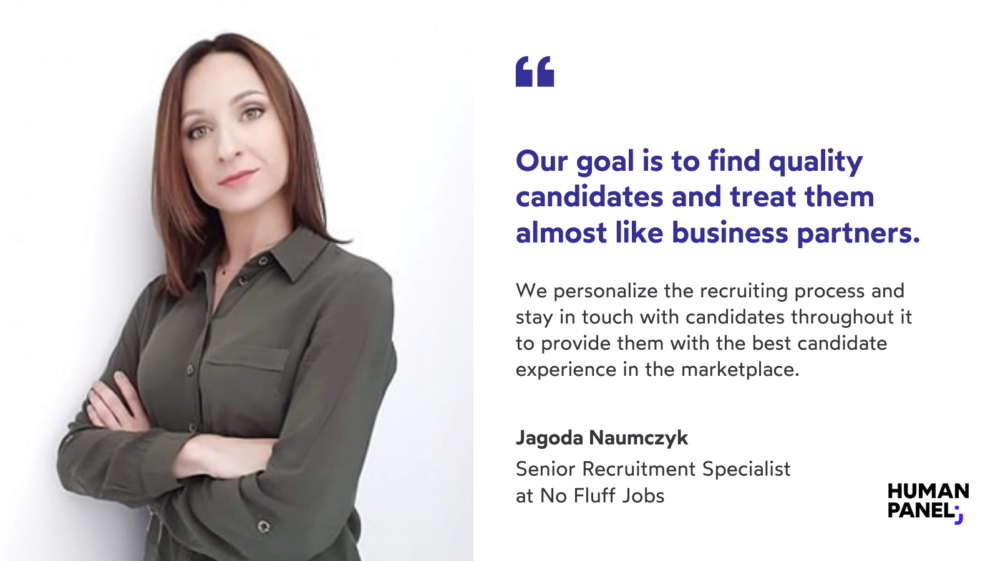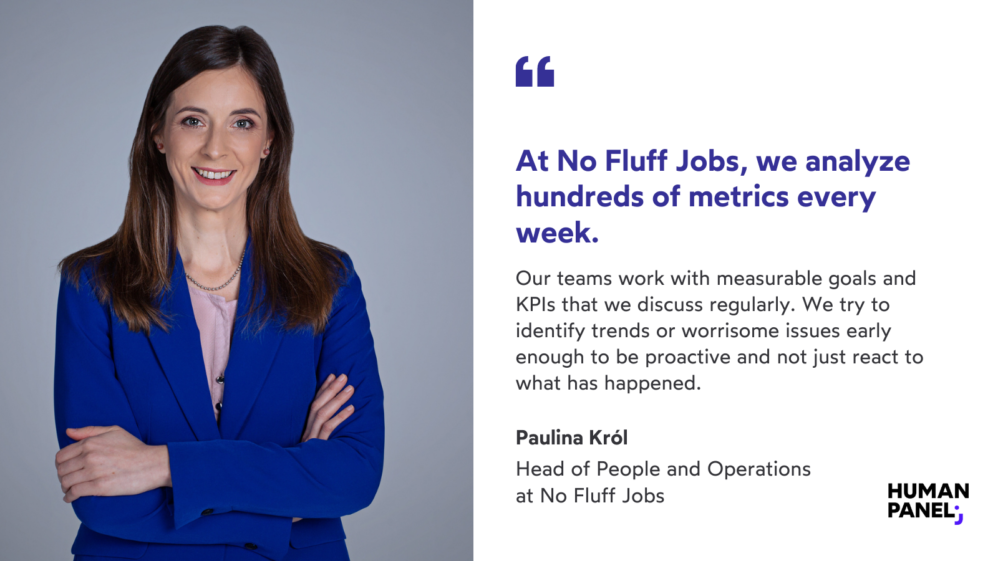No Fluff Jobs is changing the IT recruitment landscape with data and knowledge sharing

“We are on a mission to revolutionize the standards of IT recruitment, and one of the ways of doing this is through sharing our knowledge,” say Paulina Król and Jagoda Naumczyk of No Fluff Jobs in an interview with Human Panel.
It was 2014 when Magdalena Gawłowska-Bujok and Tomasz Bujok, decided to shake up the IT recruitment market in Poland. They founded No Fluff Jobs – an innovative recruitment platform that revolutionized the way companies recruit IT specialists.
As both Magda and Tomasz had in-depth experience in recruitment and IT. They knew exactly what the market needed: to get rid of the “fluff” and vague descriptions in job ads, and promote much-needed transparency.
No Fluff Jobs is now the leading job board for IT in several European markets. But the company’s mission goes beyond scaling. NFJ regularly publishes detailed reports on the state of the IT job market, providing valuable insights for the IT and HR industries. Additionally, in 2020 and 2021 No Fluff Jobs launched highly acclaimed comprehensive e-courses. They included: IT Masterclazz and HR Masterclazz, for both the IT and HR communities to invest in knowledge of the involved parties and push it to the next level.
Human Panel invited HR representatives from No Fluff Jobs – Paulina Król, Head of People and Operations and Jagoda Naumczyk, Senior Recruitment Specialist – to talk about the company’s mission to educate a wide audience through data.
Human Panel: What are the core values of No Fluff Jobs? What is at the heart of your mission?
Paulina Król, Head of People and Operations at No Fluff Jobs: Since 2014, NFJ has been changing the recruitment standards in the IT industry in Poland. Our goal has always been to raise the bar and make the process more transparent, honest and respectful for both candidates and recruiters.
We strongly believe in data transparency, which is coherent with our mission statement. We aspire for it to be evident in every aspect of our work. That’s why we always require employers to include salary ranges in job advertisements. And we are the only job board in Poland to do so.
Adherence may be challenging for some companies, but given the IT specialist’s perspective is the one we want to represent, we don’t want to give it up.
We are on a mission to change the market and that is our top priority.
Paulina Król
In order to bring even more transparency to this market and support both the specialist and recruiters to assess what is the current market standard salary for a particular position, we recently launched the first version of the salary calculator, a tool that based on thousands of real job ad data from NFJ database, calculates the median lower and upper salary range for a unique combination of IT skills and experience. For example, a Senior Frontend Developer looking for work in Warsaw with experience in Angular can verify exactly what is the current market salary for his/her combination of skills and experience.
Do you think that the salary range will become a standard in job offers – not only in the IT industry?
Jagoda Naumczyk, Senior Recruitment Specialist at No Fluff Jobs: We’d love to see that happen. Here at No Fluff Jobs, we follow the same principles that we set for our clients – we provide salary ranges for every job we offer internally.
The feedback we get from applicants shows that they really appreciate this. But despite the market need, I’d say we are more about education and evolution than revolution. It’s about the small steps that are taken in that direction. We notice that we discuss salary bands more and more often but truly we need months for such a change.

What are some of the challenges that prevent these changes to happen quicker?
Jagoda Naumczyk: Some employers worry that transparency could cause tension between employees who work on the same team but whose salaries are different. Others do not want to disclose compensation because they do not want their competitors to outbid them.
Paulina Król: I would add that companies often don’t have a specified approach as to positioning themselves on the market salary-wise. It happens that their salary scale is purely random or based on outdated models.
To set salary ranges, you need to do some research and benchmarking. It is not just about how much you are willing to pay. It’s also about how you want to be perceived on the market.
Paulina Król
So what are the benefits of posting salary ranges in a job offer?
Paulina Król: According to No Fluff Research, more than 90% of IT candidates expect a salary range in a job offer. What’s more, one-third of candidates do not even apply for jobs without a salary range. So the question is: Can employers afford to lose 30% of applicants right away?
Jagoda Naumczyk: From a recruiter’s point of view, posting salary ranges in a job ad has another advantage. It saves time – because the candidate can immediately analyze whether the offered remuneration meets his/her expectations. There is no “show me your cards” moment during the recruitment process, which is usually stressful not only for the candidate but also for the recruiter.
It’s also worth remembering that frequently these are not recruiters who set salary ranges and negotiate compensation, but rather hiring managers.
What other initiatives have you been involved with to further this push for transparency?
Paulina Król: Last year we launched a new initiative called Transparency Festival. Its goal was to share knowledge about the importance of transparency during recruitment processes, as well as celebrate the successes that have already been achieved. Over the years, we have found that if you create a detailed and data-rich job description, you can expect to get more quality applicants who better fit the description. This way, you make hiring process more effective and efficient.

We also launched a modular online course for HR specialists called HR Masterclazz. We find that many recruiters start their careers supporting IT companies but lack the adequate knowledge. This is why we are taking on the challenge of bridging this gap. Nowadays, recruiters need to keep up with the market.
Our research shows that the first contact a candidate has with a recruiter can make or break the entire hiring process. It’s crucial to be aware and sensitive of them to leave the best impression.
Jagoda Naumczyk: Often candidates ask a lot of technical and business-related questions during the first interview. It happens that recruiters do not know the answers. They lack the overview of the overall business strategy and vision of the hiring manager. Often they don’t have answers to basic questions regarding used technologies either.
I see the role of a recruiter as a person who not only guides a candidate through the process, but is also their advisor.
Jagoda Naumczyk
Therefore, I see a need for advanced business and tech training so that recruiters know what questions to ask. I also believe that hiring managers should be actively involved in the recruitment process – from defining the scope of responsibilities to assessing whether the candidate fits the company culture.
Is the pace of the hiring process an important issue here?
Paulina Król: Of course, we look at time to hire and time to fill, but at No Fluff Jobs, it’s crucial to find the right person – someone who technically fits and shares our values. Even though it may sometimes take longer, we are ready to extend the process slightly to find the right match. And given the unity around our values, our hiring managers share the same approach.
Jagoda Naumczyk: Our goal is to find quality candidates and treat them almost like business partners. We personalize the recruiting process and stay in touch with candidates throughout it to provide them with the best candidate experience in the marketplace.
Do you have any measurable goals in the HR department?
Paulina Król: We currently track basic HR metrics such as vacancy rate, recruitment funnel efficiency, time to hire, time to fill and conversion rate. We also monitor the turnover rate in different employee groups, but we see the need and are getting ready for more advanced people analytics in the future, given our dynamic growth.
Jagoda Naumczyk: Data analytics is essential, but we have an even more powerful tool at No Fluff Jobs. It is an open and transparent exchange of information between teams based on the current analysis of needs. It allows us to quickly react to challenges and share feedback. It’s a huge advantage that the culture at NFJ is built around substantial, reliable and trustworthy feedback.
How does this feedback and data help you shape your internal policies?
Paulina Król: At No Fluff Jobs, we analyze hundreds of metrics every week. Our teams work with measurable goals and KPIs that we discuss regularly. We try to identify trends or worrisome issues early enough to be proactive and not just react to what has happened. For example, we redesigned our onboarding process after receiving feedback that it was a bit too intense.
Jagoda Naumczyk: Feedback from our employees also helped us identify the need for broader knowledge sharing after we doubled in size in the last 12 months. We’ve decided to introduce a knowledge-sharing hub. This way, everyone can find out what is happening in individual departments, which contributes to even greater transparency.
What are the next challenges you will tackle at No Fluff Jobs?
Paulina Król: In my opinion, the constant big issue is creativity in recruitment. Given our growth and aspirations, we are not slowing down in terms of the pace of hiring, but we are aware of the competition on the market. Therefore, it is important to be innovative in order to attract the right candidates. To do this, we’re strengthening the collaboration with other departments like marketing and are focusing our efforts on employer branding.
Jagoda Naumczyk: We are constantly facing challenges and are very agile when it comes to responding to needs and changes. One area we definitely want to invest more in is learning and development of our employees and educating the market on the best possible recruitment practices. We like to research the market and then share the gathered data through our high-quality reports. This way, we advance your mission of changing the standards of IT recruitment in Europe.
If you want to base your HR on measurable KPIs and get a better understanding of data, try Human Panel people analytics solution. See how data insights serve as a heat map for the entire organization and start acting instead of reacting. Sign up for a free demo!




